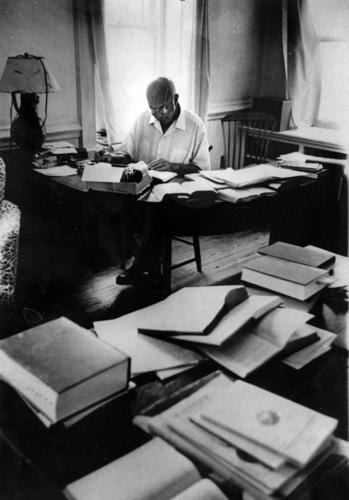From John Dos Passos' essay, "A Question of Elbow Room," from the January 25, 1958 edition of National Review ...
When all the discussions of the position of man in the framework of government that had obsessed so many of the best minds of the century came to a focus in 1776, the chief preoccupation of the state-builders in America was to establish institutions in their new country which would allow each citizen enough elbow room to grow into individuality. They differed greatly on how best to bring about that state of affairs but there was no disagreement on fundamental aims. Protection of the individual’s happiness — the assurance of the elbow room he needed to reach his full stature — was the reason for the state’s existence.Thomas Jefferson and Gouverneur Morris held very differing views on the problems of government. Jefferson was an agrarian democrat who believed that every man was capable of taking some part in the government of the community; Morris was a city-bred aristocrat who believed that only men to whom wealth and position had given the advantage of a special education were capable of dealing with public affairs; but when Morris wrote George Washington his definition of statesmanship — “I mean politics in the great Sense, or that sublime Science which embraces for its Object the Happiness of Mankind” — he meant the same thing by the word happiness as Jefferson did when he wrote it into the Declaration of Independence. To both men it meant elbow room. Elbow room is positive freedom.Consult any sociologist today as to the meaning of happiness in the social context and he’ll be pretty sure to tell you it means adjustment. Adjustment, if it is freedom at all, is freedom of a very negative sort. It certainly is the opposite of elbow room.The outstanding fact you learn from reading the letters of the men of 1776 was that none of them had any illusions about how men behaved in the political scheme. A radical idealist like Jefferson allowed for the self-interest (real or imagined) of the average voter, or for the vanity and ambition and greed of the officeholder, as much as a cynical conservative like Gouverneur Morris.Both parties understood the common man as well as any of the more desperate demagogues we have with us today. They allowed for his self-seeking, for his shortsightedness, his timidity, his abominable apathy, his only intermittent public spirit. The difference was that the statesmen of the early republic used that “sublime Science” in the service of their great statebuilding aims. Using men as they found them, they managed to set up the system of balanced self-government which made possible the exuberant growth of the United States.In Jefferson’s day the average citizen had a fair understanding of most of the workings of the society he lived in. The years that stretch between us and the day of his death have seen the shape of industry transformed in rapid succession by steam power, electric power, the internal combustion engine, and now, by jet propulsion and the incredibly proliferating possibilities of power derived from nuclear fission and fusion. Any social system of necessity molds itself into shapes laid down by the daily occupations of the individual men who form its component parts. The mass-production methods of assembly-line industry have caused a society made up of individuals grouped in families to give way to a society made up of individuals grouped in factories and office buildings, for whom family life has been relegated to the leisure hours.












































































































































































No comments:
Post a Comment